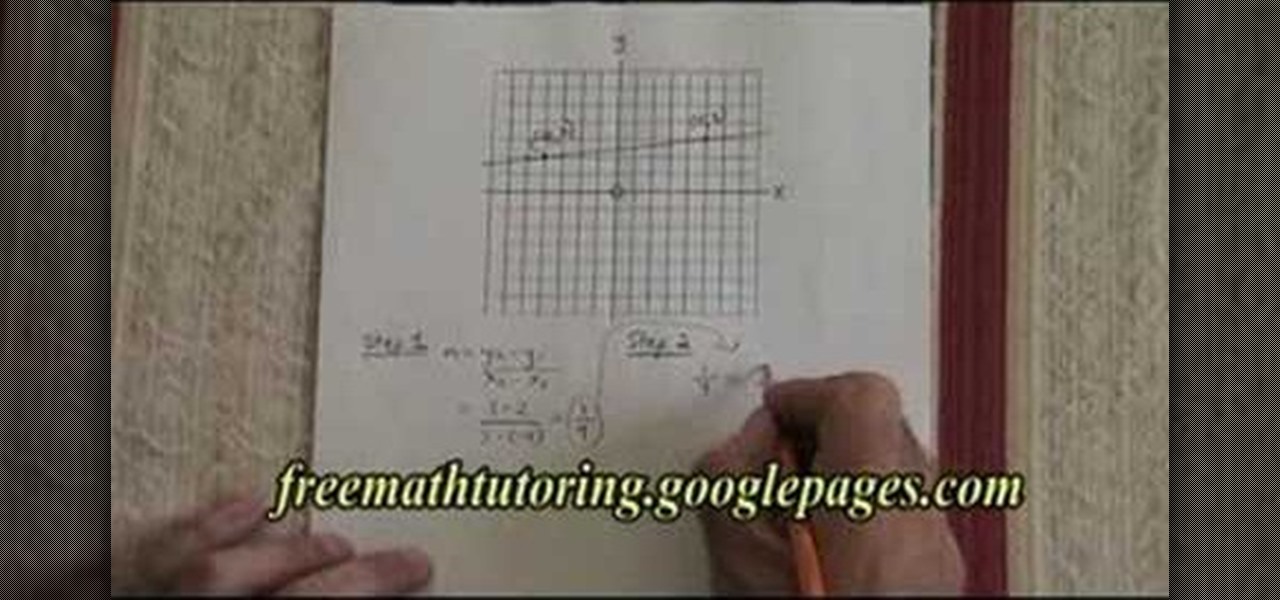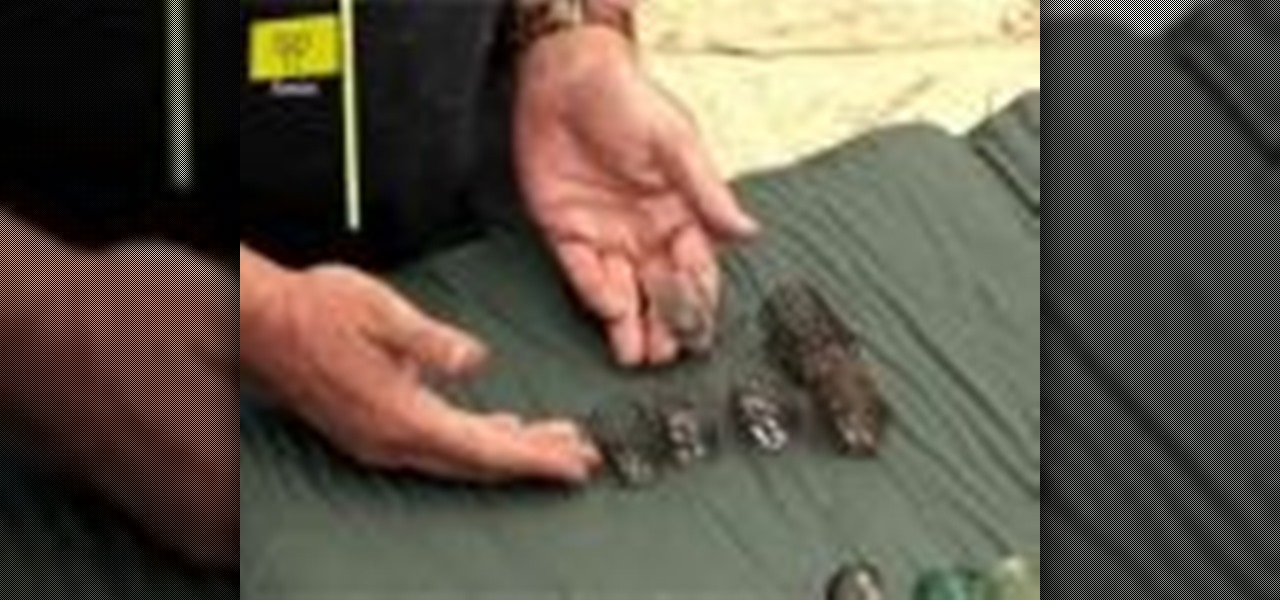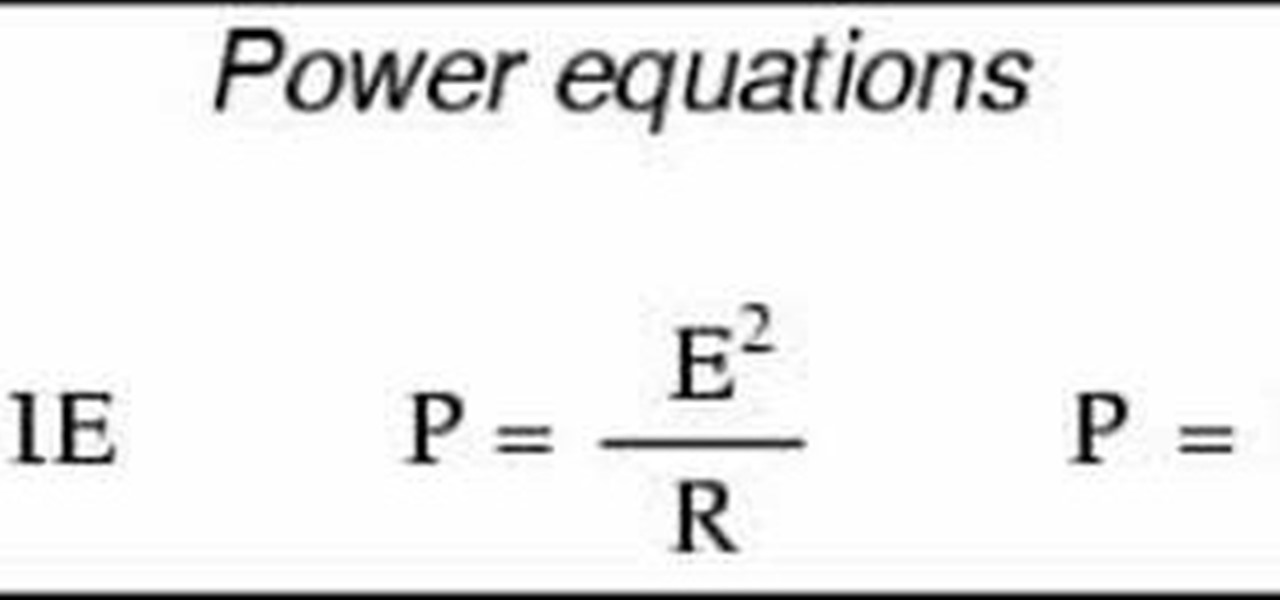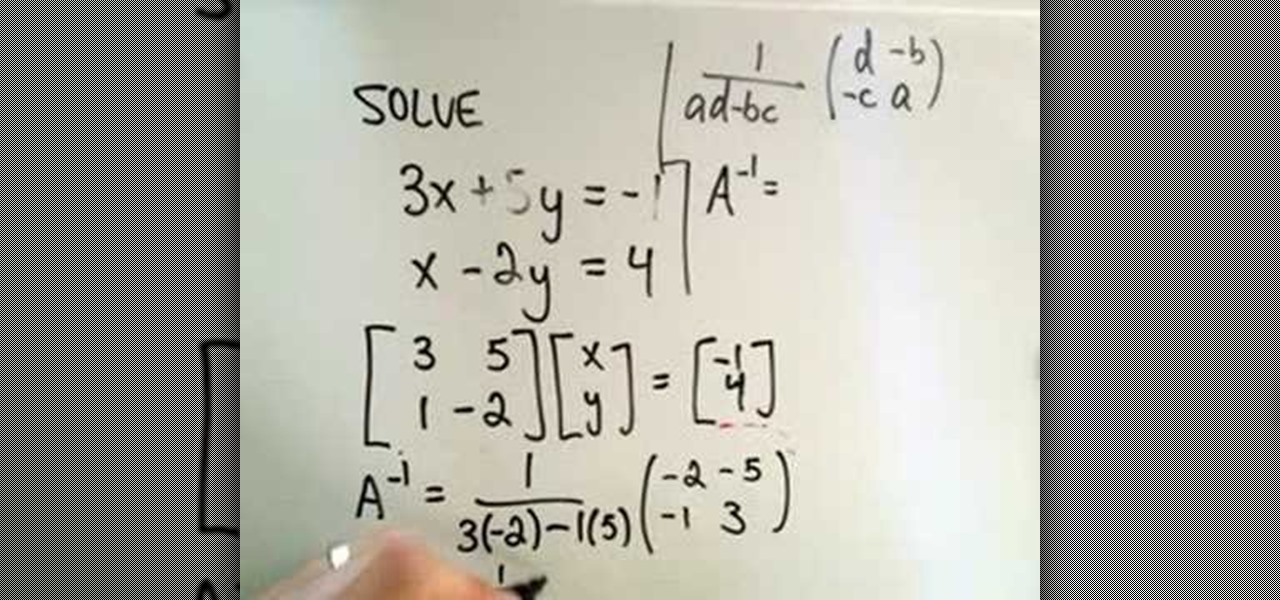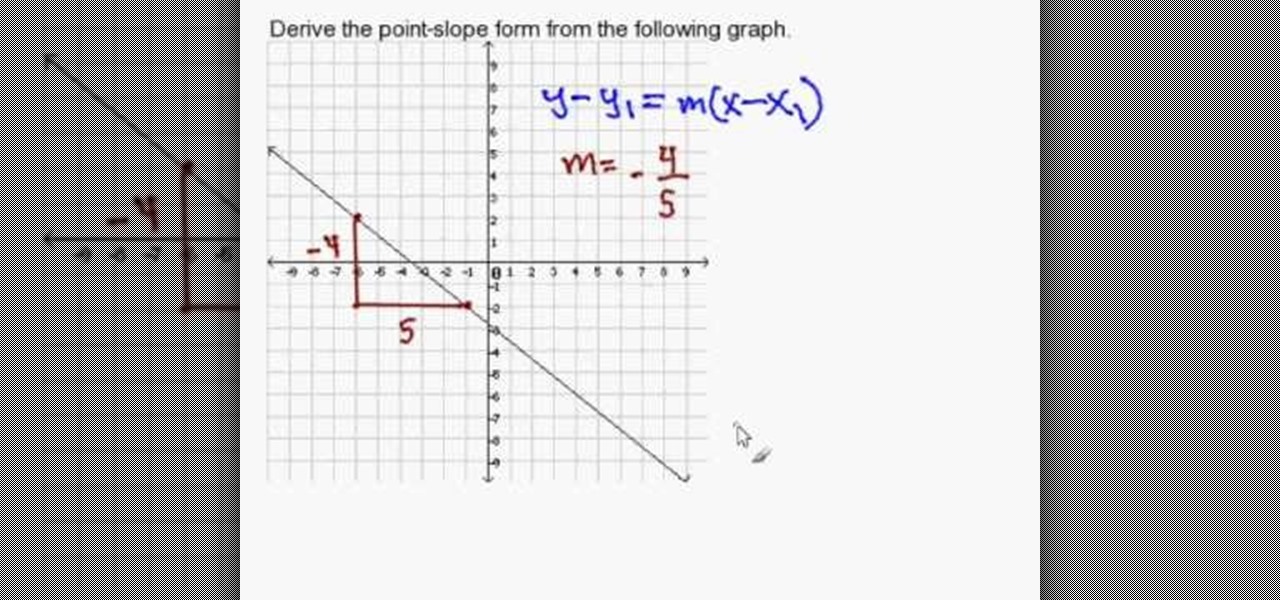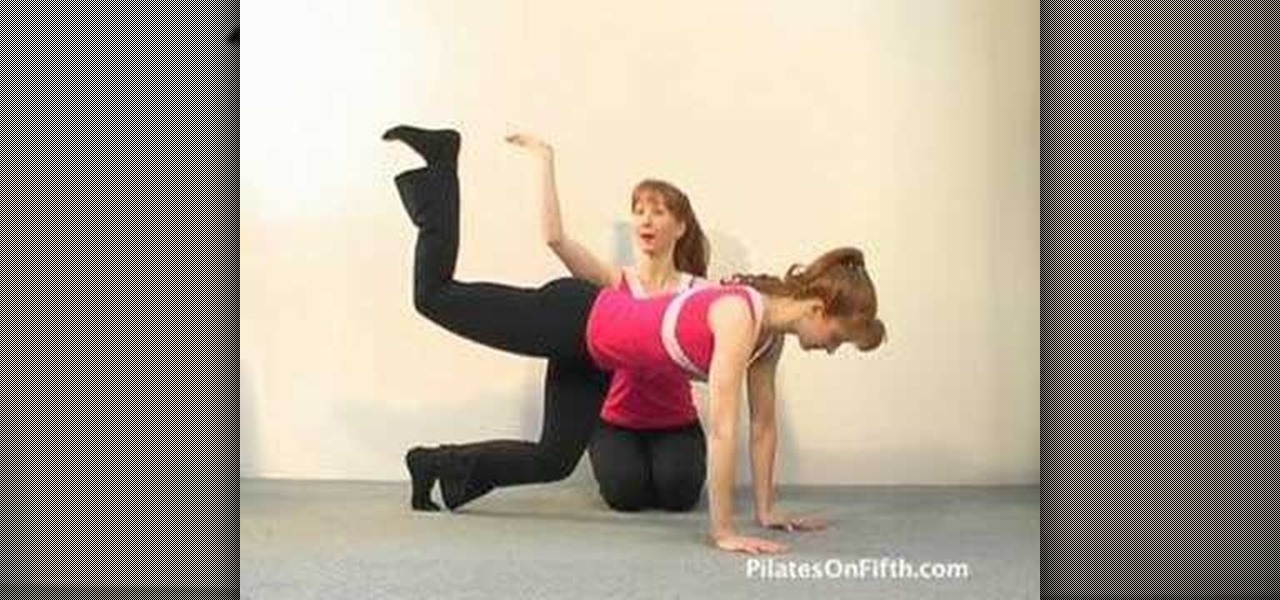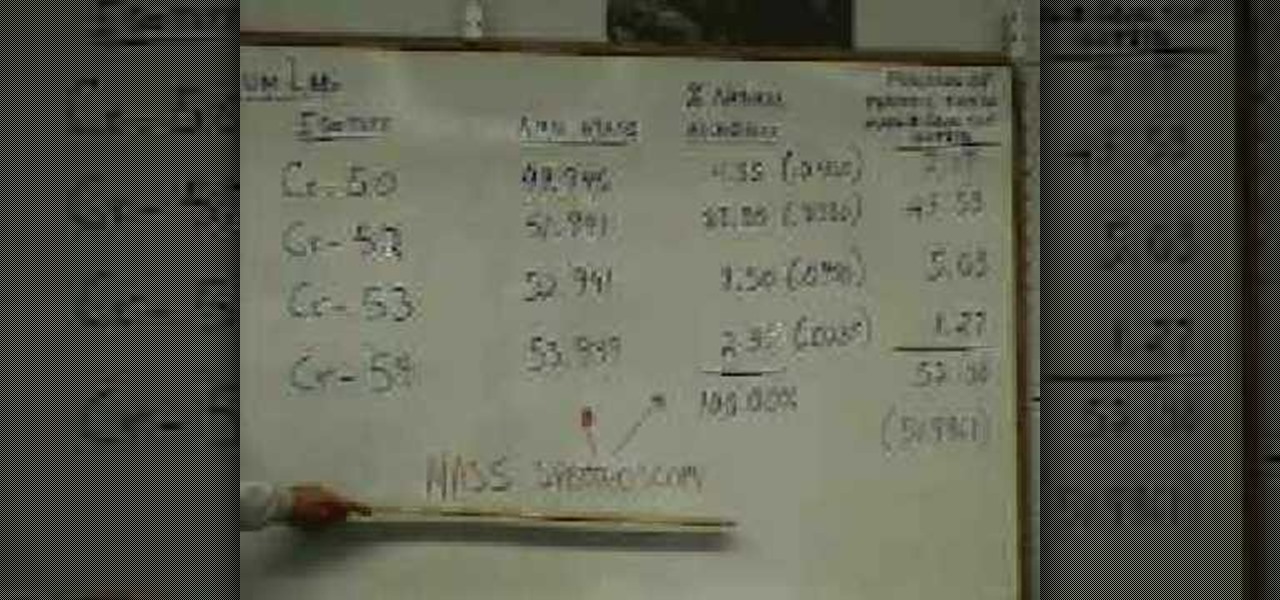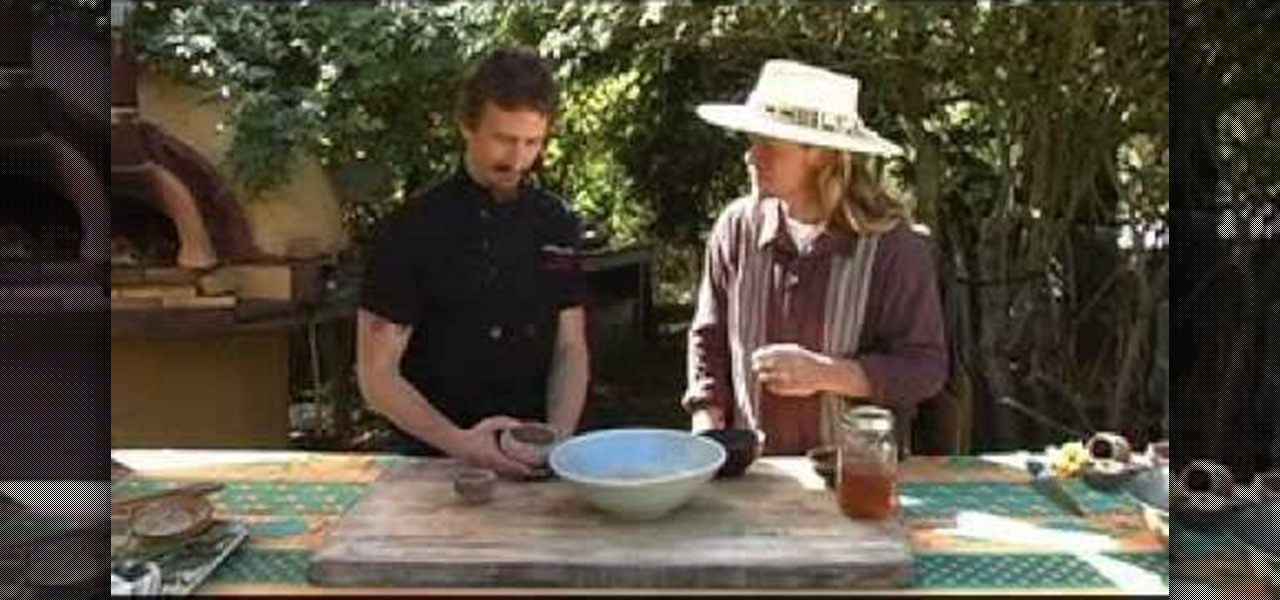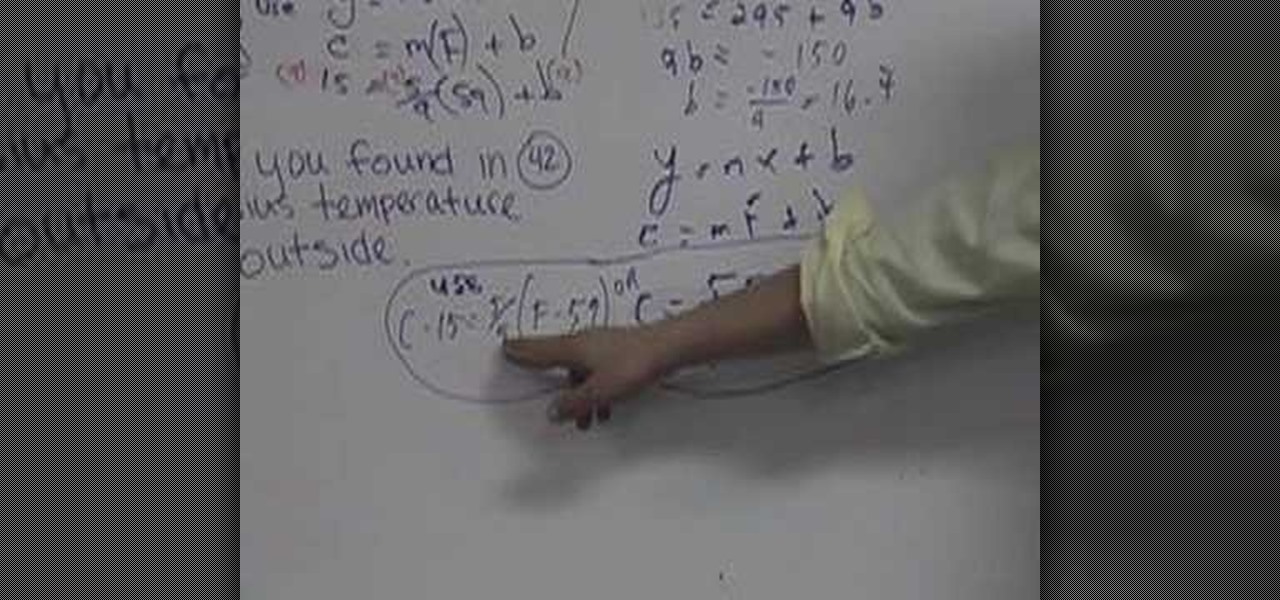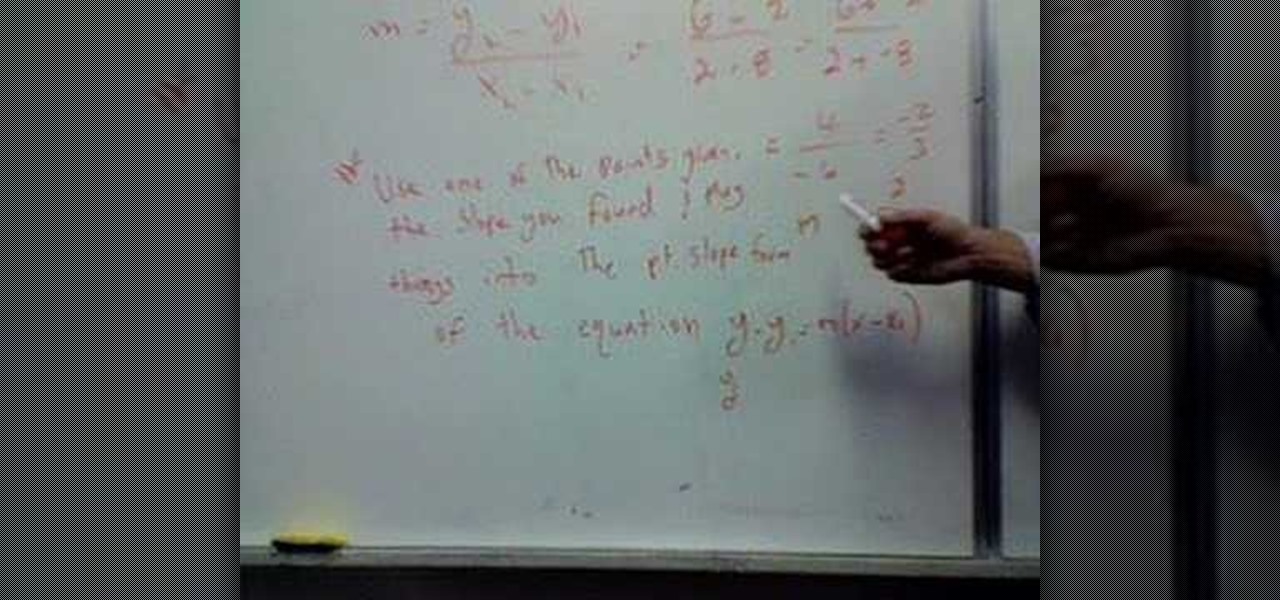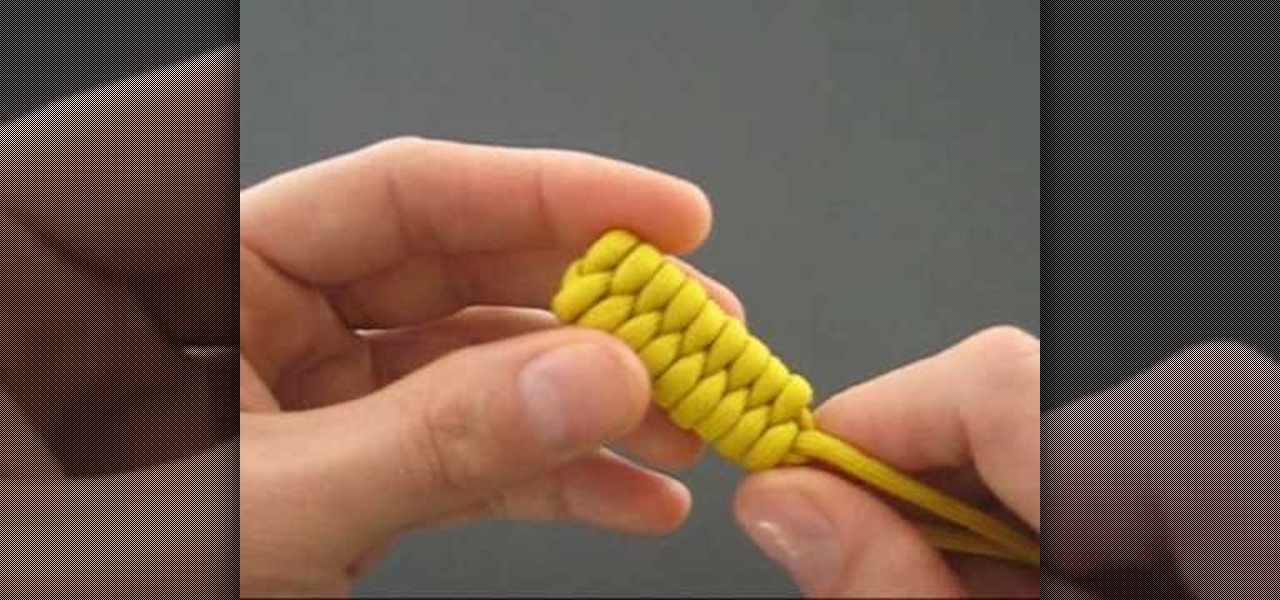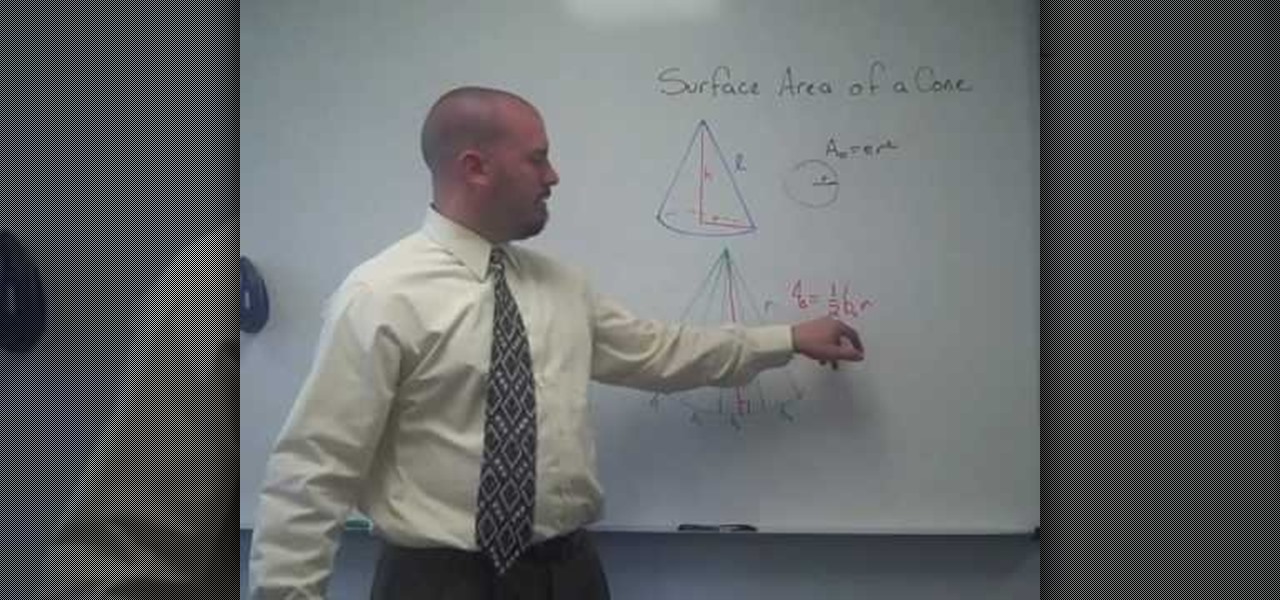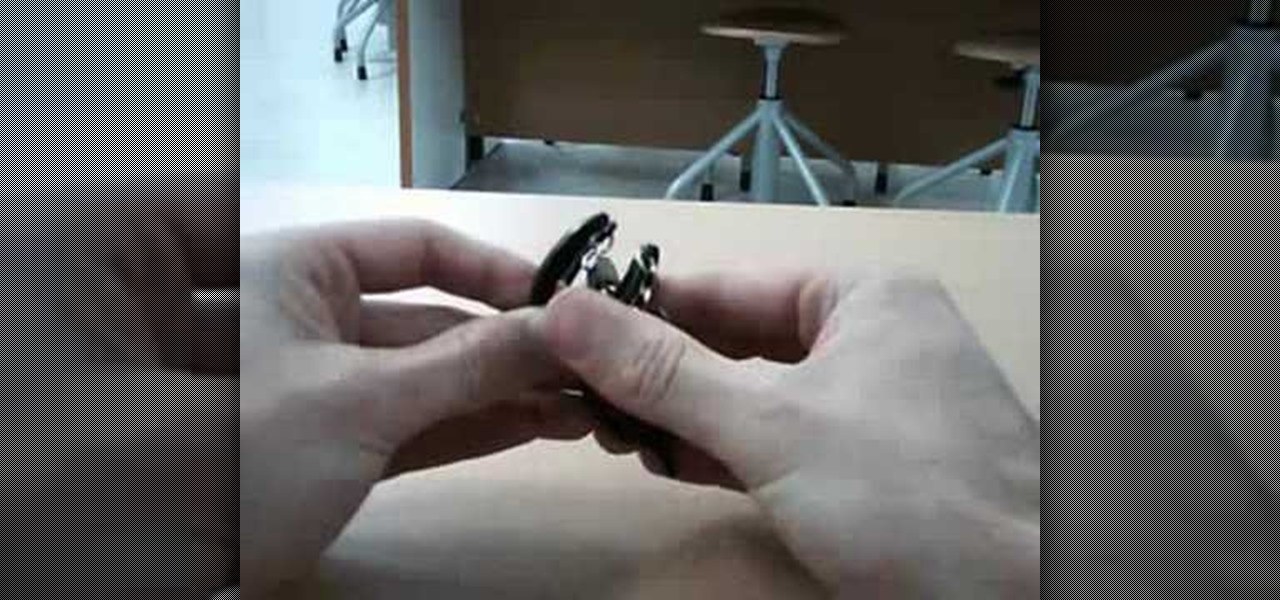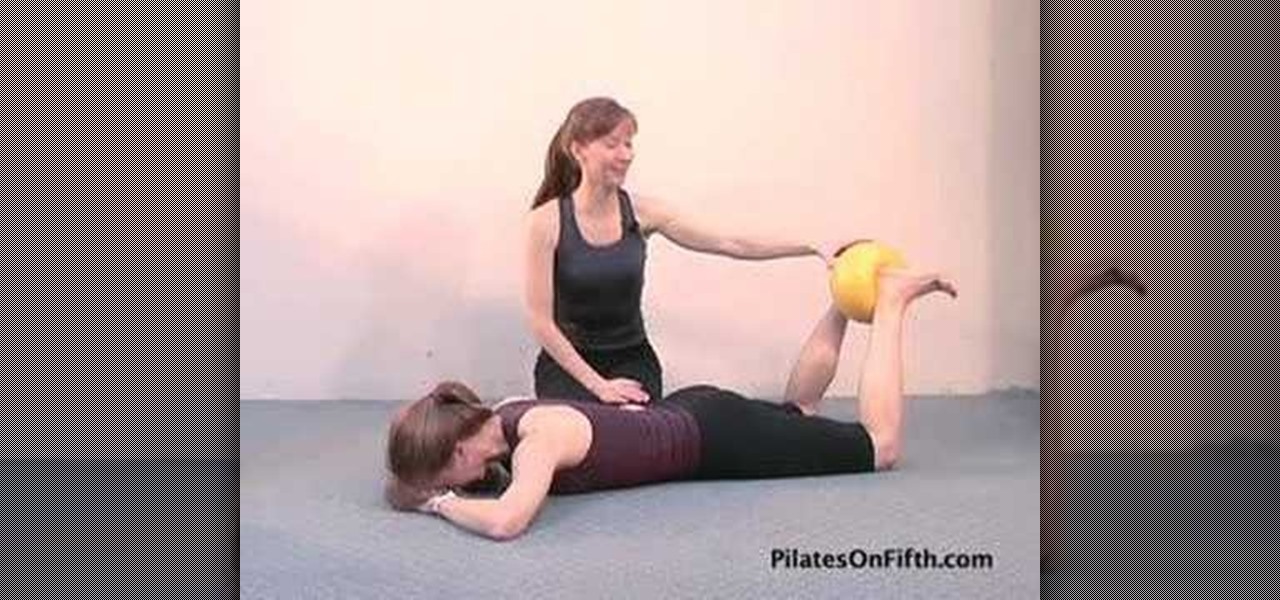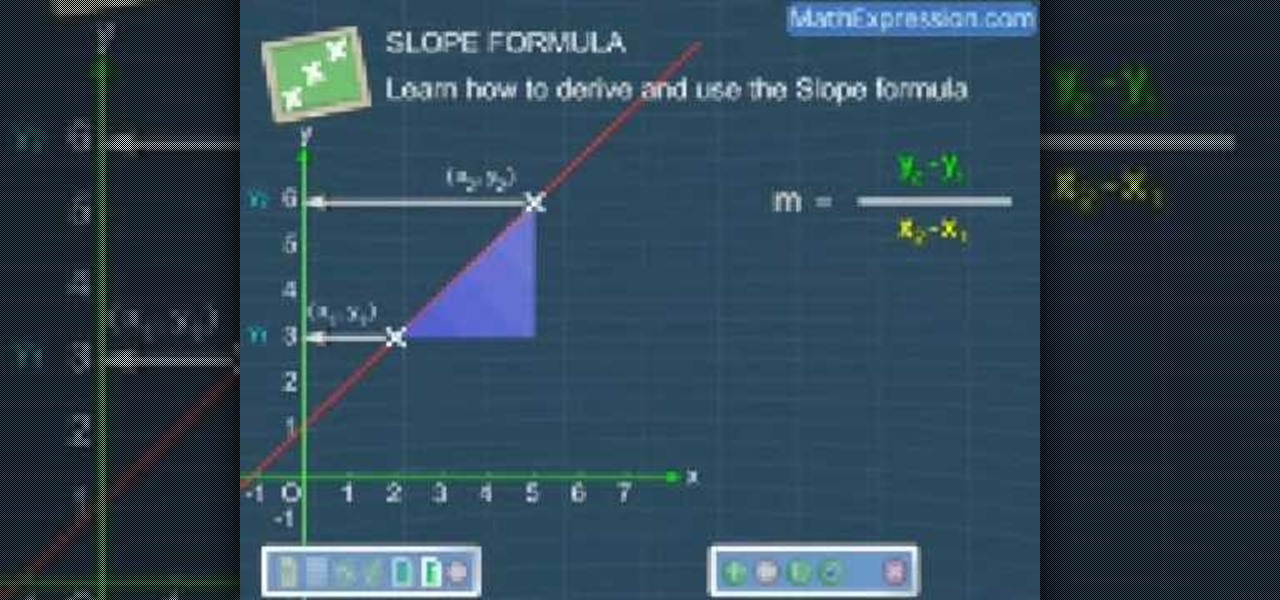
In this video, we learn how to derive and use the slop formula. The slope of a line is equal to change in y divided by the change in x. First, put the first point on the coordinate point. Then, represent the X and Y by X1 and Y1. Then, put the second point on the plane, representing the coordinates with X2 and Y2. Now, with these two points, draw a straight line and derive the formula from here. The change in X will be from X1 to X2. Now, replace that with the change in X and do the same for ...
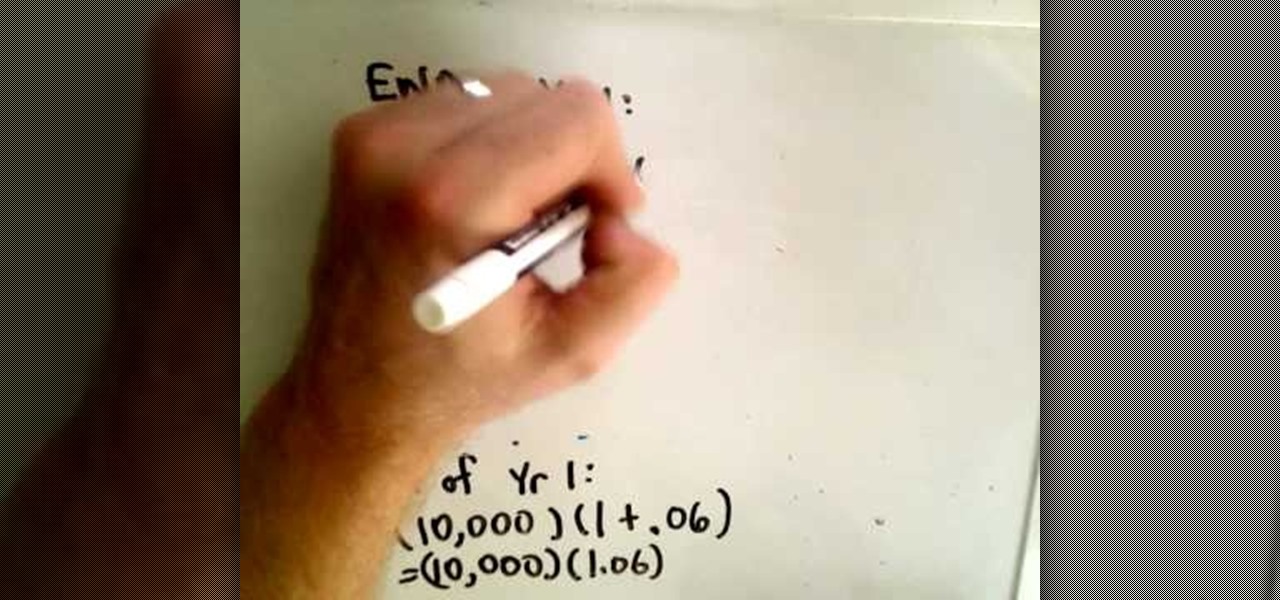
In this video tutorial the instructor shows how to derive the formula to compute interest compounded annually. He starts with explaining the basic concepts like principle which is the amount you borrow and the rate of interest or annual percentage rate (APR), which is the rate at which you pay the interest up on the borrowed principle. He shows that the amount after the end of one year is amount A = P(1+APR),and he goes on and generalizes how to compute it for n years. This video shows how to...

In this video tutorial the instructor shows how to solve equations by the comparison method. In this method he isolates either the x or y variables in both the equations and now compares the other side of equations directly to derive the value of the other variable. Now this derived value of the variable can be used by substituting it in one of the original variables to derive the value of the other variable. He goes on and shows how to do this with an example by solving it. This video gives ...
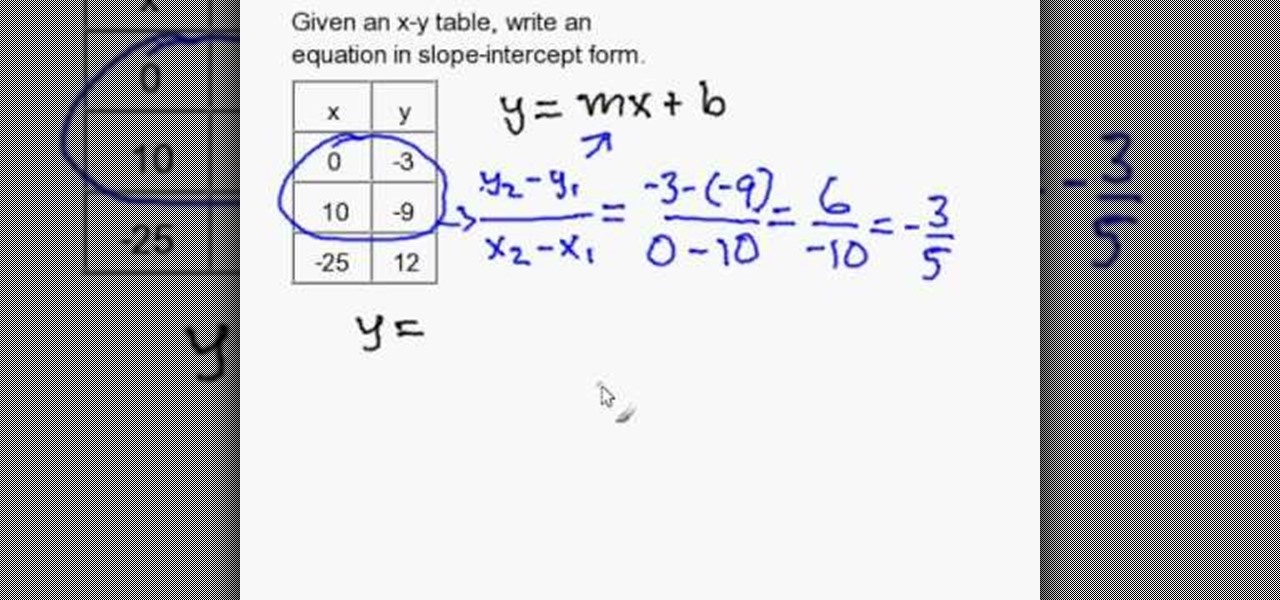
In this tutorial the author shows how to derive a slope-intercept equation of a line given an X-Y table. He explains that the general form of slope intercept form which is y = m*x + b. Now he intends to find value of slope, i.e. m first. Now slope is change in y over change in x. He computes the slope using the X-Y values from the table. Next he substitutes a pair of x, y value in the equation to compute the value of y intercept b. Now finally substituting the values in the equation the slop-...

Jailbreaking and unlocking the iPhone is the first thing most users should do if they're going to derive maximum use and enjoyment from their device. This video will show you how to use Redsn0w and this firmware to jailbreak and unlock any 3G or 3GS with 6.15.00 baseband or iPhone 4 on 01.59.00.
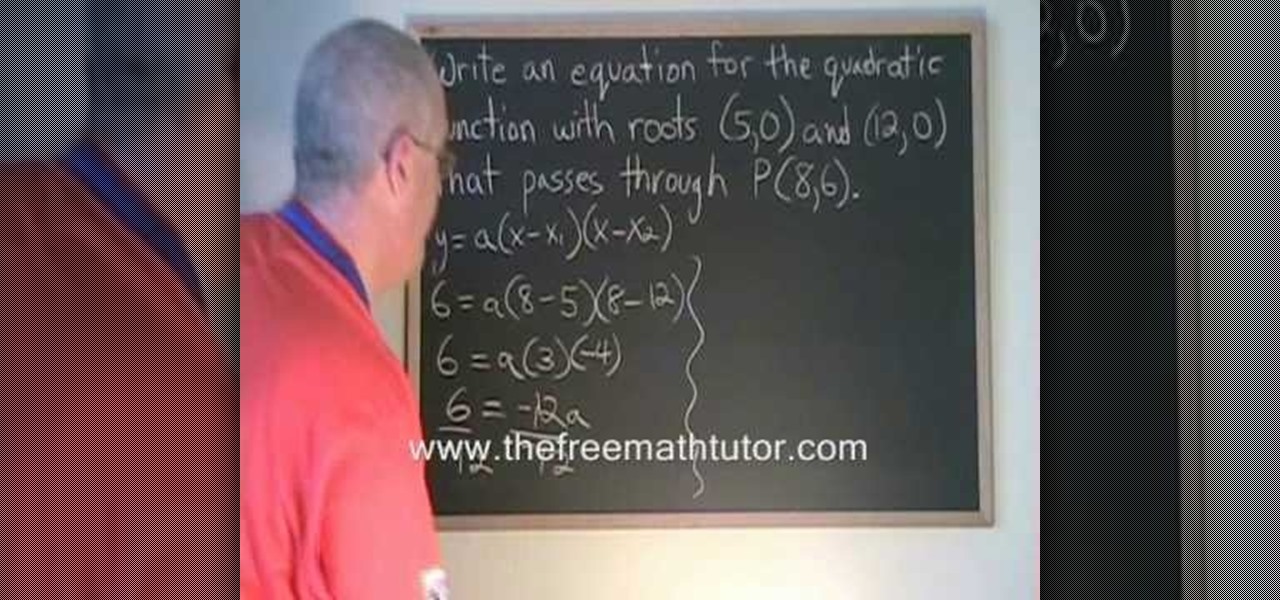
This video shows you how to get the quadratic equation for the quadratic function with roots; (5,0), (12,0) which passes through the point(8,6). It shows a man solving this problem using a black board and chalk to clearly demonstrate the method of plugging in the respective coordinates to arrive at an answer. After watching this video, any person over the age of twelve will know how to use quadratic functions to derive quadratic equations and solve mathematical problems with this particular m...

In this tutorial the instructor shows how to derive a straight line equation. He shows us a process that consists of two steps. In step one he uses the slope formula to obtain the slope of the line which is the ratio of difference of y-coordinates and difference of x-coordinates. Now in the step two he uses the slope he obtained in the first step and equates it two a another slope derivation which uses a generic x, y variables and a real point. Now solving this equation he arrives at the equa...

Whether you want to admit it or not, children tend to derive the most joy from the holidays during their Christmas present opening feeding frenzy. But if you want to engage them in something other than, well, greed, this holiday season, teach them the joy of crafting by making this origami Santa Claus.

Ledgers and feeders are important parts of bait preparation, and thus crucial to successful fishing as a whole. This video features a professional fisherman explaining how to use these two tools to bait your pole properly, maximizing your baits performance, your fish catches, and the amount of fun and relaxation that you and your friends can derive from a day spent fishing.

This video introduces the formulae for watts in an electric circuit, P=IxE, P=I^R, and P=E^/R. It also explains how P=I^R and P=E^/R are algebraically derived from P=IxE and Ohm's Law.

Thorn is a tank you can play in the newest free to play game, Bloodline Champions! Thorn's powers are all derived from nature, such as Earth Blast. This video shows you some good strategies you can use when playing with Thorn.

The West Coast swing is a dance that derives from the Lindy Hop (which is itself based on the popular Charleston), and it's a fun dance that centers around two partners compressing together and then extending apart.

See how to solve a two-by-two system of linear equations using inverses (derived from determinants). Learn how with this free video lesson. From Ramanujan to calculus co-creator Gottfried Leibniz, many of the world's best and brightest mathematical minds have belonged to autodidacts. And, thanks to the Internet, it's easier than ever to follow in their footsteps (or just finish your homework or study for that next big test).

Do the words point-slope equation send your head into a spin? Well hold on tight, because the mathproblemgenerator.com has your cure? Here you can find a informative video about calculating slope, as well as finding points to substitute into the equation. After watching this video, you will be well prepared to produce a point-slope equation from any graph.

Check out this instructional electric guitar video that provides an introduction to modes. Modes are scales that are derived from a parent scale by starting and ending on different degrees of that parent scale. This is Season 3, Episode 14 of Dave Weiner's Riff of the Week series called "The Modes: An Introduction." With this lesson and a bit of practice, improve your guitar playing skills by learning about modes on the electric guitar.

Check out this instructional electric guitar video that shows you how to derive a song from its rhythm. This is part 42 of Dave Weiner's Riff of the Week series titled "I've Got Rhythm." With this lesson and a bit of practice, improve your electric guitar playing skills by learning how to create a song's rhythm.

This instructional fine arts video demonstrates how to collage with sand paper, paint and other mixed media. The term collage derives from the French "coller" meaning "glue". Before you throw anything away, consider its potential for patterned or textured collage material. Almost any type of material can add new textures and layers to an assemblage piece.

If you have some time to kill, this is the perfect origami project to try. Admire the beauty of the structure and ponder the mathematical paradox of making curves from straight lines. This hyperbolic origami arch structure is derived from what is mathematically termed "hyperbolas". Watch this origami video and learn how simple it is to fold a mathematically inspired hyperbolic arch.

Short Plank is derived from original pilates exercises in order to teach proper abdominal and torso support in the push up position. The exercise in this how to video will strengthen your core, strengthen your shoulder girdle stabilizers and target the deep muscles of the abdomen and spine to protect your lower back. Watch this fitness tutorial and you will be toning your body with the Short Plank pilates move.

Pete Sears shows you how to play the C minor chord perfectly on your piano or keyboard. It's derived from the major chord, so if you know how to play major chords, it's easy!

Understand the concepts of drag force and how Newton's laws of motion apply to an aircraft's take off with help from NASA -- the National Aeronautics and Space Administration. The juggernaut of space exploration lays everything out on the table for you. Learn from the best, learn from the pros, learn from NASA.

Learn Newton's laws of motion from the utmost authority on aeronautics -- NASA aka National Aeronautics and Space Administration. See how Newton's laws apply to aircrafts from the powerhouse of space exploration. They talk about thrust force as applied to aviation.

This video is about Level 2 atomic concepts, specifically the Pennium Lab. This helps you understand how atomic masses are derived for the periodic table. This teacher demonstrates how to do the calculation. He first reviews the Isotopes as they are different masses of the same type of atoms. He uses chromium as his example. It has a different number of neutrons in the nucleus. Using the equation, it could have either 26, 28, 29 or 30, with its 24 protons. So he subtracts the atomic number fr...

This video is about deriving the area of a circle of radius 'r' using polar co-ordinate. First, we draw a circle and its radius 'r'. Then draw another radius close to it, so that it forms a small triangle-like figure. To find the area of the complete circle, divide the circle into similar small triangles. The area of each triangle is given by half the product of its perpendicular and the base. We give the angle between the two radii as d?. We get the area of the small triangle by substituting...

Yakisoba is one of the most popular fast food dishes in Japan. Yeah, we know what you're thinking. Fast food in a nation known for minimalist healthy couture like edamame and salmon rolls? Well, the Japanese often have a craving for fried stuff just like us, but rather than chowing down on artery clogging burgers and french fries, the take a higher route to get their fried food fill.

Hello people again, I wrote my last post about crypto about 10 months ago, now I will introduce something not fresh for the science, but fresh for the people who wants to learn. In my http://null-byte.wonderhowto.com/forum/cryptography-0161538/ post of crypto concepts, there is just basics, today we will see something that targets wide concepts like Symmetric crypto, Public Key Cryptography, Hashing, Keys etc...

In this video the instructor teaches about equivalent fractions. When given a problem to determine if two fractions are equivalent fractions the first thing to do is write them in the lowest terms. A fraction is said to be in the lowest terms if the greatest common divisor of both numerator and denominator is one. So cancel the common factors in the numerator and the denominator till you arrive at the lowest form and finally compare them to determine if they are equivalent. An equivalent frac...

Catch, gut, and cook your own food? It sounds slightly caveman-ish, but deriving your food straight from nature ensures you always know what you're eating (a luxury you don't get at the grocery store) and that you're eating healthy.

Kizomba may not sound as familiar to you as a dance like the Viennese Waltz (in fact, it sounded like a funky toy to us at first), but in Africa it's THE dance to do.

Need help drumming up new business as a Pilates instructor? This clip presents an overview of the five principle benefits derived from the practice of Pilates. Whether you're considering the possibility of starting your own Pilates studio or already have one and just need a little help tackling a particular pedagogical problem, you're sure to be well served by this free video lesson from the folks at Balanced Body Pilates. For more information, including a comprehensive overview, watch this v...

In this video the instructor shows how to find a formula describing direct variation between two variables. Variation between two variables can be either direct variation or indirect variation. If a variable y is in direct variation with a variable x we can write the general equation between them as y = k * x. That is as x varies, y varies directly in relation to x, as a multiple of x. Now if you have the values of y and x, you can substitute them in this general equation which gives you the ...

In this video the instructor shows how to do temperature conversions using y = m*x + b. Now if Celsius is represented by the variable C and Fahrenheit is represented by the symbol F, you can replace then in the previous equation in place of the variables x and y giving you the equation C = m*F + b. Now to solve for the values of the constants m and b you need to have values of two sample temperatures in both Celsius and Fahrenheit. Take the first sample and substitute in the above equation gi...

In this video the instructor shows how to derive a general equation for a line in Point-Slope form. The slope of an equation is the ratio of difference of y coordinates to the difference of x coordinates. In other words, slope is the change of y up on change of x. So you have the basic slope equation m = (y2 - y1)/(x2 - x1). When you have fractions you can simplify them by multiplying the denominator to the numerator on both sides. So multiply the equation by (x2-x1) on both sides. This gives...

Looking for a stylish, slightly menacing way to store your keys? The "rattlesnake tie" is in actuality Clifford W. Ashley's Over-And-Under Heaving Line Knot or ABOK #541. That said, the rattlesnake tie is a whole lot easier to say and remember, so that name is used here.

In this tutorial the instructor shows how to compute the Surface Area of a Cone. He explains that you need to find the individual surfaces areas first. Hence the bottom part of the cone which is circular can be calculated as Pi*r*r, where r is the radius of the base circle. Now for the sides surface of the cone, it looks like a sector and he derives its area thorough some deduction. Now he adds both the base surface area of the cone, and the lateral surface of the cone which finally gives the...

The producer of this video is Chaya Radin from the Massbay Community College, Academic achievement center and her video is titled "The effective use of quotes in academic writing". It teaches students how to learn effectively, the topic that is focused in this video is very useful for college students especially for those who write a lot of college paper. When writing college papers and if most of the ideas in the paper are derived from another source, it is always useful to use quotes so you...

Learn how to solve the Hanayama Cast W-U metal puzzle. Hanayama cast iron puzzles are the perfect solution to being bored. This video tutorial will show you exactly how to solve this mind boggling Cast W-U puzzle, which is rated a 3 out of 6 in difficulty by Hanayama.

Learn the basics of the big-band era, and get ready for a jazzy night on the town! You will need a dance partner, a sense of humor and endurance. Swing dancing tip: Open position means standing and facing your partner, maintaining some space between the two of you, and holding one or both hands. Did you know? The swing dance known as the Lindy Hop derived its name from Charles Lindbergh's famed solo flight (or "hop") across the Atlantic.

The Heel Squeeze is derived from the principles of classical pilates exercises. This pilates tutorial teaches how to engage the gluteus maximus muscles without engaging the lower back muscles. We demonstrate this exercise both with and without a small ball, but the ball is definitely not necessary to reap all the benefits. Focus on keeping the pelvis flat on the mat, the abdominal muscles pulled in and flat and tension out of the neck and shoulders while your tone your derriere. Watch this ho...

Viva La Vegan explains how to cook with the grain quinoa. Quinoa is a tiny grain like rice or millet. Use the ratio of one cup of quinoa to two cups of water when cooking with quinoa. After it's cooked it gets a white periphery around the grain. Use quinoa in salads, stir-fry and in curries. Take a thermos and add one cup of quinoa and two cups of boiling water. Let it sit overnight. In the morning it will be ready for a quinoa porridge or instant oats. Quinoa is a complete protein that conta...








